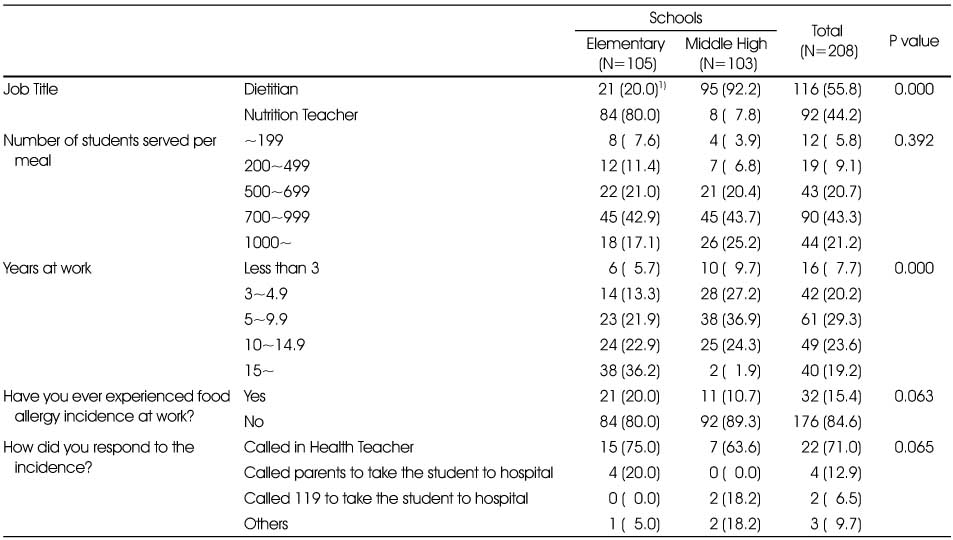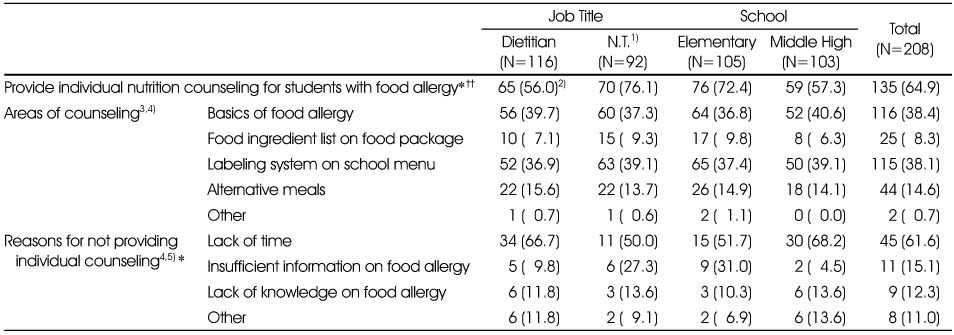Articles
- Page Path
- HOME > Korean J Community Nutr > Volume 21(3); 2016 > Article
-
Research Article
- Food Allergy Management Status by Dietitians and Nutrition Teachers in Elementary and Middle Schools in Incheon
-
Aruem Yoon, Soo-Kyung Lee

-
Korean Journal of Community Nutrition 2016;21(3):247-255.
DOI: https://doi.org/10.5720/kjcn.2016.21.3.247
Published online: June 30, 2016
1Graduate Program of Nutrition Education, Inha University, Incheon, Korea.
2Department of Food and Nutrition, Inha University, Incheon, Korea.
- Corresponding author: Soo-Kyung Lee. Department of Food and Nutrition, Inha University, 100 Inharo, Namgu Incheon 22212, Korea. Tel: (032) 860-8121, Fax: (032) 862-8120, skleenutrition@inha.ac.kr
Copyright © 2016 The Korean Society of Community Nutrition
This is an Open-Access article distributed under the terms of the Creative Commons Attribution Non-Commercial License (http://creativecommons.org/licenses/by-nc/3.0/) which permits unrestricted non-commercial use, distribution, and reproduction in any medium, provided the original work is properly cited.
- 1,204 Views
- 5 Download
- 2 Crossref
Figure & Data
REFERENCES
Citations

- Study on the status of food allergy management and importance-performance analysis about precautions of food allergy in school foodservice according to the school types in Jeonbuk area
Ji Yeon Kim, Jeong Ok Rho
Journal of Nutrition and Health.2020; 53(3): 329. CrossRef - The School Meal Workers' Recognition and Management of Food Allergy in Gangwon Province
Meera Jang, Soo-Jin Lee
Journal of the East Asian Society of Dietary Life.2018; 28(6): 391. CrossRef
Characteristics of the study participants
1) N (%)
Food allergy education status1)
1) No statistical significance were found by job title or school.
2) N (%)
Food allergy knowledge status by job title and school
1) N.T.: Nutrition Teacher
2) N (%)
3) D.K.: Do not know
4) Mean (SD)
**: p<0.01 significantly differ by school
†: p<0.05 significantly differ by job title
Food allergy management status by job title and school
1) N.T.: Nutrition Teacher
2) N (%)
3) Proportion among schools with regular monitoring program(s)
4) Multiple choice allowed
*: p<0.05 significantly differ by school
†: p < 0.05, ††: p<0.01 significantly differ by job title
Nutrition counseling for students with food allergy
1) N.T.: Nutrition Teacher
2) N (%)
3) Proportion among respondents with individual counseling program (s)
4) Multiple choice allowed
5) Proportion among respondents without individual counseling program (s)
*: p<0.05 significantly differ by school
††: p<0.01 significantly differ by job title
Emergency response system for food allergy outbreak at school
1) N.T.: Nutrition Teacher
2) N (%)
**: p<0.01, ***: p<0.001 significantly differ by school
††: p<0.01, †††: p<0.001 significantly differ by job title
1) N (%)
1) No statistical significance were found by job title or school. 2) N (%)
1) N.T.: Nutrition Teacher 2) N (%) 3) D.K.: Do not know 4) Mean (SD) **: p<0.01 significantly differ by school †: p<0.05 significantly differ by job title
1) N.T.: Nutrition Teacher 2) N (%) 3) Proportion among schools with regular monitoring program(s) 4) Multiple choice allowed *: p<0.05 significantly differ by school †: p < 0.05, ††: p<0.01 significantly differ by job title
1) N.T.: Nutrition Teacher 2) N (%) 3) Proportion among respondents with individual counseling program (s) 4) Multiple choice allowed 5) Proportion among respondents without individual counseling program (s) *: p<0.05 significantly differ by school ††: p<0.01 significantly differ by job title
1) N.T.: Nutrition Teacher 2) N (%) **: p<0.01, ***: p<0.001 significantly differ by school ††: p<0.01, †††: p<0.001 significantly differ by job title

 KSCN
KSCN






 Cite
Cite


